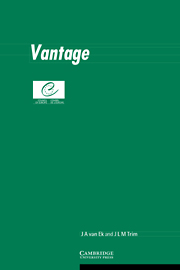Book contents
- Frontmatter
- Contents
- Introduction
- 1 The objective: levels of specificity
- 2 The objective: general characterisation
- 3 The objective: extended characterisation
- 4 The objective: components of the specification
- 5 Language functions
- 6 General notions
- 7 Topic-related tasks and lexicon
- 8 Discourse structure and verbal exchange
- 9 Dealing with texts: reading and listening
- 10 Writing
- 11 Sociocultural competence
- 12 Compensation strategies
- 13 Learning to learn
- 14 Degree of skill
- 15 By-products
- APPENDICES
3 - The objective: extended characterisation
Published online by Cambridge University Press: 28 January 2010
- Frontmatter
- Contents
- Introduction
- 1 The objective: levels of specificity
- 2 The objective: general characterisation
- 3 The objective: extended characterisation
- 4 The objective: components of the specification
- 5 Language functions
- 6 General notions
- 7 Topic-related tasks and lexicon
- 8 Discourse structure and verbal exchange
- 9 Dealing with texts: reading and listening
- 10 Writing
- 11 Sociocultural competence
- 12 Compensation strategies
- 13 Learning to learn
- 14 Degree of skill
- 15 By-products
- APPENDICES
Summary
Practical transactions
Learners are able to cope with transactional situations in everyday life. At Vantage level, learners are able to deal more flexibly with these situations than at Threshold level, when they are problematic or take an unexpected turn. With enriched language resources (especially a wider vocabulary), learners are able to express their needs and intentions more precisely, with less (though still some) need for compensatory strategies.
Contacts with officials
Note In all contacts with officials learners are able to ask for repetition, clarification and explanation, etc. of any information, questions or documents not understood, and are able to ask for the services of an interpreter and/or legal adviser in case of serious difficulty (cf. Chapter 12).
Immigration
Learners are able to understand and complete necessary documentation.
Learners are able to understand and answer questions concerning:
personal identification (cf. Appendix A, section 1)
the duration and purpose of their visit
Customs officers
Learners are able to understand and complete necessary documentation.
Learners are able to understand and answer questions concerning:
whether they have dutiable items to declare
the contents of their luggage and the value of items
where they have come from and where they have acquired items of property
whether items are for personal use or as gifts or for commercial use
Security officers
Learners are able to understand and answer questions covering:
the contents of their hand-baggage, pockets, etc.
whether their baggage contains specified items (e.g. electronic equipment, real or toy weapons, etc.)
who has packed or handled their baggage
- Type
- Chapter
- Information
- Vantage , pp. 9 - 20Publisher: Cambridge University PressPrint publication year: 2000



